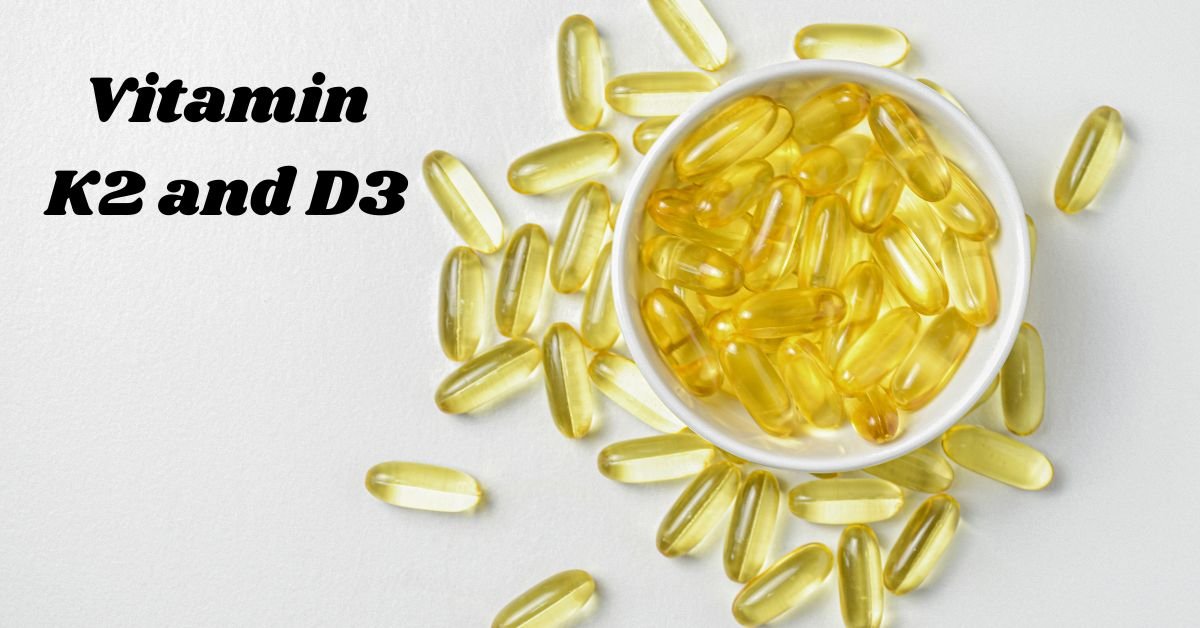Introduction to Vitamin K2 and D3
Ever ponder why specific vitamins are heralded as nutritional superheroes? The dynamic players that carry a health punch are vitamin D3 and vitamin K2. Although prominent vitamins like B12 and C receive much attention, these lesser-known minerals also merit attention. They strengthen immunity, improve cardiac function, and maintain bone health in the background.
Imagine providing the resources your body requires to survive. When coupled, K2 and D3 are precisely capable of doing that. What, though, makes them so unique? As we explore their advantages, you’ll see how essential they are to preserving general health. So sit and get ready to discover these vital vitamins’ mysteries!
What are the Benefits of Vitamin K2?
More people are becoming aware of the importance of vitamin K2 to our health. Strengthening bones is one of its main advantages. It contributes to activating proteins that maintain your bones’ strength and resilience by binding calcium to the bone matrix.
Additionally, this vitamin is essential for maintaining cardiovascular health. Controlling calcium metabolism, which also keeps arteries from calcifying, can avoid heart disease. A longer life is correlated with a healthy heart.
Furthermore, vitamin K2 maintains tooth structure, which contributes to dental health. Strong teeth are essential for general health and appearance.
Besides these advantages, recent studies indicate that K2 may positively impact insulin sensitivity and metabolic processes. This implies that, over time, it might contribute to preventing diseases like diabetes or obesity.
With all these possible benefits, you might need to realize how crucial it is to include vitamin K2 in your daily regimen.
What are the Benefits of Vitamin D3?
Cholecalciferol, another name for vitamin D3, is essential for preserving bone health. It improves the gut’s absorption of calcium, which is necessary for healthy bones and teeth.
This potent vitamin also affects immune system performance. Sufficient vitamin D3 can help the body fight infections and minimize inflammation.
Furthermore, studies indicate that vitamin D3 might help regulate mood. Specific research associates it with decreased rates of anxiety and sadness, suggesting that it may be a valuable ally for mental health.
Additionally, heart health is considered. According to newly available data, it promotes cardiovascular health and normal blood pressure levels.
Getting adequate Vitamin D3 is essential for general health and has many advantages for different body systems.
The Synergistic Effects of Vitamin K2 and D3
Vitamins D3 and K2 combine surprisingly well. They work together as a dynamic duet to assist many biological functions, which is good for your health.
Vitamin D3 is essential for the body to absorb calcium. But if there’s enough vitamin K2, calcium might get to the bones, where it’s most required. Alternatively, it can build up in arteries or soft tissues, which could cause problems.
K2 stimulates proteins that help direct calcium to the appropriate locations. This preserves cardiovascular health and guarantees strong bones.
According to research, taking these vitamins in combination is more efficient than taking them separately to increase bone density. Their combined effect maximizes the body’s use of minerals.
Including both vitamins in your regimen could have more advantages than taking each separately. Together, their complementary actions support longevity and general wellbeing.
Food Sources and Supplementation of Vitamins K2 and D3
Fermented foods, like natto, a traditional Japanese dish made from soybeans, are good sources of vitamin K2. Egg yolks and hard cheeses are further sources. These choices offer a delectable method of increasing your intake.
The most natural way to get vitamin D3 is from sunlight. This essential nutrient is produced when UV rays contact your skin. Nevertheless, it can be challenging to acquire enough in the winter or for people living in less sunny climates.
Both vitamin supplements are readily available and may be helpful if you need more than your diet to meet your needs. Look for high-quality products that mix K2 and D3 for maximum health benefits.
Before beginning any supplementation regimen, always get medical advice to ensure it’s right. This stage assists in customizing your strategy according to specific health needs and lifestyle variables.
How to Incorporate Them Into Your Diet
Including vitamins K2 and D3 in your diet might be easy and tasty. First, fermented foods, such as natto, high in K2, are added. Egg yolks and firm cheeses are other choices.
For vitamin D3, consider eating fatty fish, such as mackerel or salmon. These not only add necessary nutrients to meals but also improve their flavors.
For those seeking convenience, fortified meals are a sensible option. These days, vitamins K2 and D3 are added to many cereals, dairy products, and plant milk.
Recall the sun! Being outside promotes the body’s natural production of vitamin D. Just be careful when you’re in the sun.
Another enjoyable approach to increasing your intake is through smoothies. For a wholesome treat, blend leafy greens with fruits and yogurt that contains these essential vitamins.
Potential Risks and Side Effects
Although most people can safely use vitamins K2 and D3, there are some possible hazards. Before taking vitamin K2, anyone using blood thinners should speak with their doctor. Anticoagulants and this vitamin may interact, decreasing the effectiveness of both.
Toxic effects might arise from consuming too much vitamin D3. Nausea, vomiting, weakness, and serious consequences such as kidney damage are possible symptoms.
Although uncommon, allergic reactions can occur with any supplement. It’s critical to get medical help right away if you take these supplements and develop strange symptoms.
Nursing or pregnant women should also approach supplementing cautiously and talk to their doctor about it. Maintaining a balance of nutrients is essential because taking too much of one vitamin might throw off your body’s equilibrium—Prioritise expert advice above everything else when adding new supplements to your regimen.
Conclusion
Vitamins D3 and K2 are essential for preserving general health. Their advantages are remarkable, but they also have a harmony that improves wellbeing.
Including these vitamins in your daily routine can have several benefits, such as increased cardiovascular health and bone density. You may fully grasp their significance when you comprehend how they complement one another.
It’s now simpler than ever to include a variety of food sources in your diet. Supplementation is another choice if necessary.
You can make sure you’re choosing your vitamins wisely by paying attention to your body’s needs and seeking advice from medical professionals. Make these nutrients a priority for a healthier lifestyle and acknowledge their potent impact.
FAQs
What is the difference between Vitamin K2 and K1?
While vitamin K2 is essential for heart and bone health, vitamin K1 primarily aids blood clotting. Though they have different purposes in the body, both are significant.
Can I get enough Vitamins D3 and K2 from food alone?
Although many people may find it difficult, receiving these vitamins through diet is feasible. Supplements fill the gaps left by those who don’t consume enough food to meet their needs.
Are there any risks associated with taking Vitamin D3 or K2 supplements?
Both vitamins are usually safe when taken as directed. Excessive consumption, though, may cause issues. Getting medical advice before starting a new supplement regimen is generally advisable.
How much Vitamin D3 should I take daily?
The suggested daily amount varies according to age and health. Although 600–800 IU is a general recommendation for adults, individual needs may vary depending on sun exposure or particular medical problems.
Is combining Vitamins K2 and D3 effective for everyone?
Most people benefit from this combination because of their complementary effects on calcium metabolism; nonetheless, it is essential to consult a healthcare expert for specific advice regarding unique health circumstances.
Do vegetarians or vegans have higher risks of deficiency in these vitamins?
Certain animal products, such as fatty fish, are natural sources of Vitamins D3 and K2, so vegetarians and vegans may need to be more careful about the amount of fortified meals or supplements they consume.
Given the emphasis on nutrition these days, knowing how the various vital nutrients interact can help you manage your overall health.






